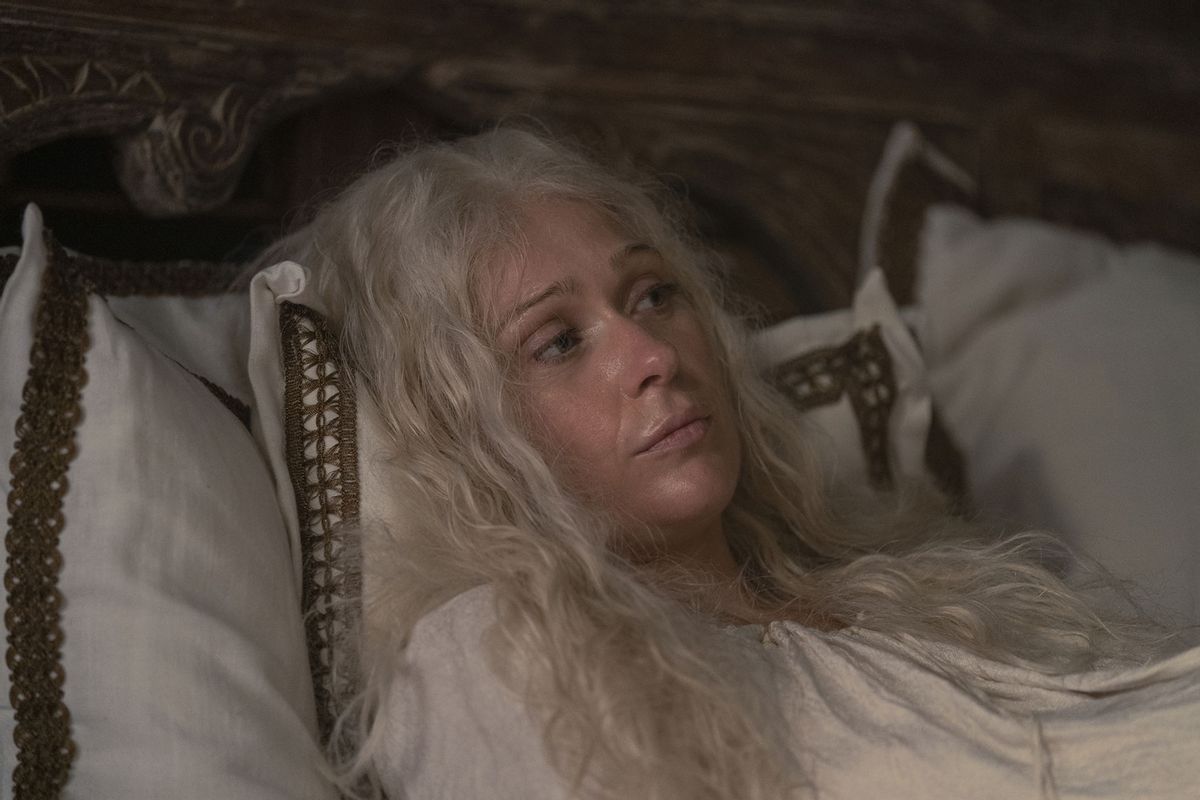The series premiere of "House of the Dragon" included some shocking moments, none moreso than the horrific caesarean section procedure performed on Aemma Arryn, done without the pregnant queen's consent in order to remove her breeched baby from her womb. "Game of Thrones" was known for hitting viewers with gory twists, but even compared to most of the things shown on the original series, what happened to Aemma was hard to watch.
While showrunners Miguel Sapochnik and Ryan Condal have insisted that the scene was done with the utmost care and that it was shown to "as many women as possible" to gauge their reactions, it's understandably sparked a lot of debate online. On the one hand, "Game of Thrones" has often tried to realistically depict some of the more violent aspects of the Middle Ages from which "A Song of Ice and Fire" author George R.R. Martin drew inspiration, and childbirth during that time was extremely dangerous. That said, childbirth today is still pretty dangerous even if modern medical advancements do make things like C-sections much safer, and many people have traumas related to difficult births. Those viewers might not want to see something so triggering dramatized like this, or at the very least, they might want to know about it in advance.
This has brought about the question: should "House of the Dragon" have included a trigger warning to let viewers know the series premiere would include a traumatic birth scene?
Experts weigh in on whether the "House of the Dragon" premiere needed a trigger warning
"I think it's fairly traumatic for anybody actually. With 13 babies dying every day in the UK, the situation impacts an enormous community of people directly too," Jen Coates told Radio 1 Newsbeat, per the BBC. Coates is the director of the bereavement support charity Sands, and is of the opinion that it is "really important" that shows like "House of the Dragon" give viewers notice before depicting something with so much real-world trauma associated with it. "That way, people can be better equipped with the knowledge and make an informed decision to watch or skip particular scenes or episodes."
Writer Laura Birek examined whether "House of the Dragon" should have included a trigger warning at Shondaland, where she notes how the traumas associated with her own labor caused her and her husband to swiftly turn off the series premiere in the middle of Aemma's controversial scene. Birek herself had a C-section birth, and co-hosts a pregnancy podcast where she was able to give some viewers a warning about Aemma's scene.
"I genuinely wish I had this warning before watching it, as I'm scheduled for a C-section in 32 days," replied one listener, while others thanked her for helping them make a more informed decision about whether watching would be too traumatic given their own experiences.
"What Condal and Sapochnik fail to recognize is that childbirth is still an incredibly dangerous situation," writes Birek. "To claim that modern medicine has fixed 'all of the complications' demonstrates a breathtaking ignorance about pregnancy and childbirth. To think that the violence of birth disappeared with jousting tournaments and the feudal system shows that they've never had to contemplate how to extract an 8-pound baby from their midsection."
"House of the Dragon" is not the only show to feature a sequence that brought about calls for content warnings. Back in May, both "Obi-Wan Kenobi" and "Stranger Things 4" premiered shortly after the Uvalde shooting, which was bad timing because both open with instances of violence being committed against children. "Stranger Things" added in a trigger warning ahead of release. "Obi-Wan" did not, but retroactively put a warning on the first episode.
"I physically held my mouth closed as tears poured down my face," one of Birek's friends — who recently had her own difficult pregnancy experience — said of Aemma's traumatic birth scene. "'Stranger Things' edited in a content warning because they premiered so close after the Uvalde massacre. But this [premiere] had nothing, when women since the beginning of time have had difficult births. Women remain so incredibly and astoundingly unconsidered."
"House of the Dragon" premiere probably should have had a trigger warning
Birek puts forth that she's "not saying the episode should be taken down or even revised," only that "some of us are exhausted parents trying to survive and heal our own trauma. Give us a little heads-up, and let us decide whether this is something we can handle."
For my own part, I'll just put it out there and say that I wholeheartedly agree with this stance. In fact, I gave both of the people I watched the premiere with — one of whom recently had a difficult pregnancy — this exact trigger warning so that they could better decide whether they wanted to watch Aemma's scenes or not. It doesn't take a lot.
"Game of Thrones" often shocked viewers with its bloody twists. Would trigger warnings give viewers an advance heads up of what lies ahead? Perhaps, slightly. But I'd say it's worth it to give the show's audience a more respectful viewing experience. "House of the Dragon" is a show about a misogynistic patriarchal system bucking against the idea of women having power. Almost by definition, it is going to have difficult scenes that will likely make some modern viewers uncomfortable. Therefore, "House of the Dragon" has a responsibility to handle its presentation well and not jar viewers with thoughtlessness.
For those of you reading this, wondering what other horrors await on "House of the Dragon" Season 1, I will give you a slight warning now. I've seen the first six episodes, and have written up my spoiler-free thoughts about them here. Aemma's birth scene is by far the most uncomfortable scene of the show out of what I've seen, but this is a medieval milieu family saga centered on an incestuous dynasty. There will be other birth scenes. Not all of them will end badly, but some will. Consider yourself warned.
"House of the Dragon" airs new episodes on HBO and HBO Max Sundays at 9:00 p.m. EST.




Shares